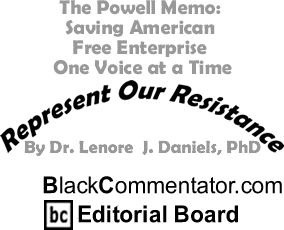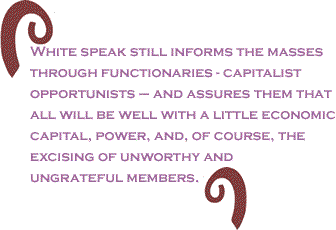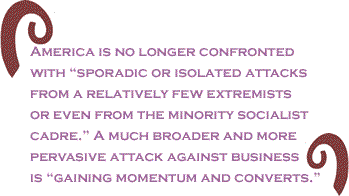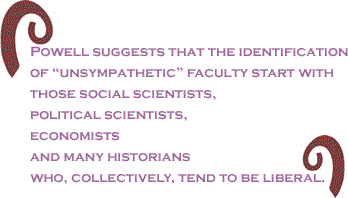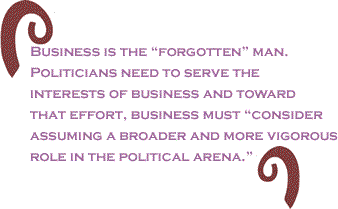
|
||||||||||||||||||||||
 |
||||||||||||||||||||||
 |
||||||||||||||||||||||
 |
||||||||||||||||||||||
 |
||||||||||||||||||||||
 |
||||||||||||||||||||||
 |
| The current issue is always free to everyone |
|
|
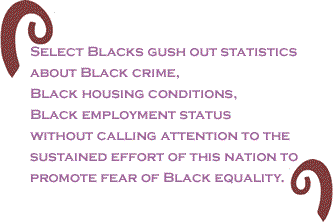 |
The
silencing of the Black, Brown, Red, Yellow, poor, and low-wage
worker is a long time tactic along the way toward the corporatizing
of the Worse, as with the majority of the American public, the Black masses don’t read since too many are busy surviving a daily assault of shock and awe on American soil. Most are likely to latch on to the very news sources that speak to “people” and only occasionally refer to “Blacks” when reporting a crime or “minorities” when reciting some dreary statistic about the less than, the Other. Most have lost the skill of “reading” the nuances of white speak. White speak, then, informs them indirectly of what is or isn’t acceptable, what they should think, in other words. They know they are hurting. They know they are struggling to stay afloat. Yet many surrender to the political, social, and economic status quo. They resign themselves to the belief that the overall system of doing business in American can’t change. Money rules and the rulers control money. Troops of Black scholars serve as the “national guard,” prohibiting sustained discussions on white privilege and the institutional work of racism within the agenda of capitalist imperialism. Select Blacks gush out statistics about Black crime, Black housing conditions, Black employment status without calling attention to the sustained effort of this nation to promote fear of Black equality. And so white speak still informs the masses through functionaries - capitalist opportunists – and assures them that all will be well with a little economic capital, power, and, of course, the excising of unworthy and ungrateful members.
"Power in defense of freedom is greater than power in (sic) behalf of tyranny and oppression,” Malcolm said. But the people are urged to stay loyal to the election system, to compromised “peace” politicians garner at the expensive of Black interests and human rights, and stay loyal, above all, to the free enterprise system, even if you find yourself, your family, your community flowing down a river once again. A memo, written in 1971 predicted your predicament! The Powell Memo, penned by Lewis F. Powell, (a corporate lawyer and member of 11 corporate boards), articulates a problem and offers a solution to the downward spiral of the American free enterprise system. The memo is written to Eugene Sydnor, Jr., Director of the U.S. Chamber of Commerce. According to the author, what needs saving is business, for it is business that is under attack and if business is under attack, then the entire American free enterprise system is in danger. This is the problem. And just who or what group is the enemy of the free enterprise system? To
clarify, Powell writes that While these “attackers” included the usual Communists, New Leftists, and “other revolutionaries who could destroy the entire system, both political and economic,” they are now joined by the most “disquieting voices,” - “perfectly respectable elements of society.” Collectively, these groups are one “chorus of criticism,” representing voices from the college campuses, pulpits, media, intellectual and literary journals, arts and sciences and politicians.” Powell asserts, that while “in most of these groups, the movement against the system is participated in only by minorities, it is these individuals who are “the most articulate, the most vocal, the most prolific in their writing and speaking.” The media permits these “attackers” to communicate to the American public without censorship! “This is especially true of television, which now plays such a predominant role in shaping the thinking, attitudes and emotions of our people.”
The
extent to which the “enterprise system” participates in its
own destruction is a “bewildering paradox,” writes Powell
as he points to examples of the “tone,” “character,” and “intensity
of the attack.” He cites how the late attorney William
Kunstler was “warmly welcomed on campuses” and how a professor
from How awful these attackers! The
publishing of books similar to the Greening of America
written by Charles Reich damages the image of business
in the As a result of their disparaging attacks, business has suffered. “By appeasement, ineptitude and ignoring the problem” - these “attackers,” business has suffered. The traditional role of business executives, not trained in “guerilla warfare with those who propagandize against the system” has been “to manage, to produce, to sell, to create jobs, to make profits, to improve the standard of living, to be community leaders, to serve and generally to be good citizens.” Business has done its job “very well indeed” but for these attackers, these ungrateful beings that solicit the help of a Nader to “win” concessions from companies only trying to do their job. “What specifically should be done?” Powell asks. Business
must “confront this problem” as its primary responsibility.
For business, survival is primary,” Powell, claims. “Survival
of what we call the free enterprise system means the “strength
and prosperity of Powell proposes several points of counterattack in which the Chamber of Commerce will be a key factor. The first step would be to designate an executive vice president - whose responsibility is to counter-on the broadest front-the attack on the enterprise system. The public relations department could be one of the foundations assigned to this executive, but his responsibilities should encompass some of the types of activities referred to subsequently in this memorandum. His budget and staff should be adequate to the task. In
addition, each individual corporation would offer favorable
“independent and uncoordinated” activities of counterattack.
While the role of the Chamber of Commerce in this endeavor
to corporatize
The next stage of counter attack should take place at the college campuses. Powell writes, “Although origins, sources and causes are complex and interrelated, and obviously difficult to identify without careful qualification, there is reason to believe that the campus is the single most dynamic source” [of danger to the American enterprise system]. Powell suggests that the identification of “unsympathetic” faculty start with those social scientists, political scientists, economists and many historians who, collectively, tend to be liberal. Faculty “unsympathetic to the enterprise system…need not be in a majority.” But they are often personally attractive and magnetic; they are stimulating teachers, and their controversy attracts student following; they are prolific writers and lectures; they author many of the textbooks, and they exert enormous influence - far out of proportion to their numbers - on their colleagues and in the academic world.
While these young people clog up the system, the effort of business, Powell states, must be to “restore” “openness,” “fairness,” and “balance” to the academic communities. The administrators and faculties also have a vital role to play in conjunction with government. “Our” colleges and universities must take the ultimate responsibility to restore “integrity” to these campuses. Thus, another point of counterattack would be to recruit highly qualified scholars in the social sciences who believe in the system and invited them to work for the Chamber of Commerce. In the process, the Chamber should establish a speakers’ bureau for the faithful believer. In turn, this “staff of scholars” will evaluate textbooks and monitor campuses to assure that “equal time” on the college speaking circuit is given to the selected faculty. As for textbooks, Powell offers this scenario: since “the civil rights movement” and other groups like the “labor unions” have not “hesitated to review, analyze and criticize textbooks and teaching materials,” it’s imperative that in a “democratic society” the Chamber’s concern for “academic freedom” is known. If these “attacker” authors and publishers and writers know “they will be subjected” to honest and fair review of their work “by eminent scholars who believe in the American system,” “a return to a more rational balance can be expected.”
Powell warns that to restore “balance” at the college campuses will not be a battle for the “fainthearted.” So Powell continues, the general American public will also play a role in this battle against the “attackers.” must be in on this battle. The Chamber of Commerce must work to bring the public to the corporations. “It will be essential to have staff personnel who are thoroughly familiar with the media,” [and who know the most effectively way] to communicate with the public.” Therefore, the “staff of scholars” must monitor television not only programming but “news analysis which so often includes the most insidious type of criticism of the enterprise system.” Representatives of radio, the press along with scholarly journals must be challenged.
There needs to be an end to business serving as “the favorite whipping-boy of many politicians.” “Few elements of American society today have as little influence in government as the American businessmen, the corporation, or even the millions of corporate stockholders.” Business is the “forgotten” man. Politicians need to serve the interests of business and toward that effort, business must “consider assuming a broader and more vigorous role in the political arena.” Powell who will be appointed by President Richard Nixon soon after writing this memo and who will serve as a U.S. Supreme Court justice, urges the Chamber to be a greater influence in the courts. “The judiciary may be the most important instrument for social, economic and political change.” In turn, the Chamber’s influence within the courts will clamp down on such organizations like the ACLU that “initiates or intervenes in scores of cases each year.” For this work to be effective, the Chamber needs faithful lawyers who, along with believing scholars, will fight these “liberal organizations.” Finally, stockholders, in turn, will mobilize support for an “educational program and political action program.” We have come full circle! Powell
concludes that “attackers” of the American enterprise will,
in time, note a more “aggressive” attitude from business.
“It is time for American business - which has demonstrated
the greatest capacity in Do you doubt the power of the corporations today? What politician would dare challenge their power? Do the corporation’s politicians care anything about “individual freedom”? And
should there be any surprise at the recent revelations of
last week that the U.S. government, the King’s cadre of Darth
Vader, Condi Rice, Donald Rumsfeld, Colin Powell, John Ashcroft
and others - met several times in “secret” sessions to watch
demonstrations of torture techniques? King George, not present
at these sessions, gave his approval of them and the resulting
We are angry and we should be. We must respond with a movement that arises from our anger against the real “attackers” before it’s too late, before we are told that our angry exemplifies public misspeak! BlackCommentator.com Editorial Board member, Lenore Jean Daniels,
PhD, has been a writer, for over thirty years of commentary,
resistance criticism and cultural theory, and short stories
with a Marxist sensibility to the impact of cultural narrative
violence and its antithesis, resistance narratives. With entrenched
dedication to justice and equality, she has served as a coordinator
of student and community resistance projects that encourage
the Black Feminist idea of an equalitarian community and facilitator
of student-teacher communities behind the walls of academia
for the last twenty years. Dr. Daniels holds a PhD in Modern
American Literatures, with a specialty in Cultural Theory
(race, gender, class narratives) from
|
Your comments are always welcome. e-Mail
re-print notice
If you send us an e-Mail message we may publish all or part of it, unless you tell us it is not for publication. You may also request that we withhold your name. Thank you very much for your readership. |
|
| May
1, 2008 Issue 275 |
|
| Executive Editor: Bill Fletcher, Jr. |
| Publisher: Peter Gamble |
| Est. April 5, 2002 |
| Printer Friendly Version in resizeable plain text format format |
 |
 |
 |
| |
| |





















